Sharon Bryan
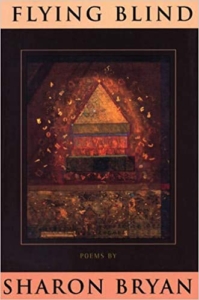 Last fall, on the recommendation of Kathleen Flenniken and Holly J. Hughes, I decided to take a Hugo House course from poet Sharon Bryan. Wanting to get to know her a bit, first, I purchased three of her books—and plunged in.
Last fall, on the recommendation of Kathleen Flenniken and Holly J. Hughes, I decided to take a Hugo House course from poet Sharon Bryan. Wanting to get to know her a bit, first, I purchased three of her books—and plunged in.
Sharon’s Flying Blind (Sarabande Books, 1996) is, itself, a plunge. It drops a reader not so much into the tangible stuff of a life, as into language. And, from there (because from where else?) we swim back into life. I knew right away that I wanted to write a blog post about this book. Its 40-some poems are arranged without sections. Titles point us toward the book’s obsession: “Be-,” “Conjugation,” “-Esque,” “Ode to the OED,” “Subjunctive.” The last begins: “If only”—in a book where nothing is quite what it seems. As the poet writes in “Dissembling”: “Let’s keep an eye / on what’s impossible, its friction // with what is.”
Beneath this layer of playful verbal acrobatics, there is another layer. As Frederick Busch says in his cover praise: “behind the brainy and considering voice-in-the-poems is real woundedness, real and interesting experience, a particular history and earned awareness that refuses to let the book be ‘abstract.’…It’s felt thinking.”
I emailed Sharon and asked how Flying Blind came into being. Her response was a master-course:
After my second book came out, I knew I wanted to make a different kind of poem from the ones in those books. I didn’t think they were bad, but I knew they didn’t reflect my sense of the relationship between language and the world, which is that language creates the world we live in and move through. In those first books, the reverse is true: the poems describe the world as if it were a given. I was determined to find a way to write new poems grounded in that sense of language as shaper of what we see and feel. So I took a deliberate six-month break from writing poems to get the old voices out of my head, and during it read and re-read books from philosophy and anthropology about language. When I started writing again, I wrote poems that started with language as subject matter. I was also able to draw on humor—something central to me—in a way I hadn’t before.
I’d written maybe a dozen or fifteen poems before I discovered the order they should be in. I was keeping them in alphabetical order in a folder so I could find them easily when I gave a reading, and one day I joked to myself that maybe that could be the order. But then I thought, “Wait, it’s all about language. I can use that order.” It wasn’t a strict sense of writing a poem for each letter of the alphabet—I didn’t. But it gave me ideas for some poems. And I knew that I wanted the last one I wrote to be the first in the book, so I gave it a title that would put it there: “Abracadabra.”
But the biggest discovery of all for me didn’t come until the manuscript was almost finished. Only then did I see that while the surface of the poems was all about language, the emotions that drove the poems came from the deaths of three friends a decade earlier. The three were Richard Blessing, Richard Hugo, and Hugo’s stepson Matthew Hansen. All three had died of different kinds of cancer within a two-year period. All three were poets, they knew each other and had many friends in common, so it was a community event, very intense and moving. I came to realize that in my grief I had thrown myself on the mercy of language as if it were a safety net—and it was. I would never have presumed to tell their stories myself, but those three told them through the poems I wrote.”
That line, “I had thrown myself on the mercy of language” made me decide to use almost all that Sharon emailed to me. It’s the answer to a puzzle I’ve been stymied by while working on a book of elegies about my parents. “We can’t quite see / the world,” she writes in the title poem, “but we have it / in translation.” Reading this book made me think about how my usual reliance on the concrete, the event exactly as it happened, is a sort of crutch, a nostalgia. To paraphrase Richard Hugo (a quote she deployed more than once in our class): you owe reality nothing, the poem, everything. [Or, as Sharon elaborated in another email exchange, “we write to get at the truth of how we think and feel”—not that we don’t revere the truth but that “reality” can get in our way.]
What to do with this insight? Well, she has a poem for that, too:
Minutiae
Having things is a way to forget
about them: straight teeth, enough
food, the midnight blue silk dress.As if memory and longing were kissing
cousins, and to have were to quench
the light and heat of desire.So writing things down, love
or the list of groceries, is a way
to leave them behind, perfusedwith a certain day that will rise
like ether from the wrinkled page
when you come across it. Forgettingkeeps things whole by letting them
go—the woman become a tree,
for example, or the man a constellation.What clings to us is incidental,
dust too fine to cohere
and become forgettable.—Sharon Bryan
You can read more of Sharon’s poems under the poems tab at her website, and I especially recommend the video at the bottom of the page (look for “from Eureka”).

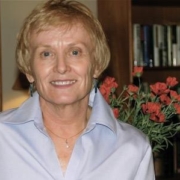
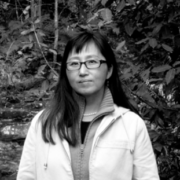
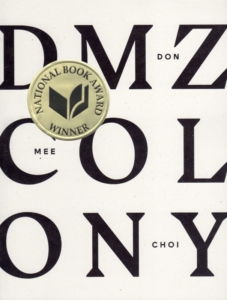
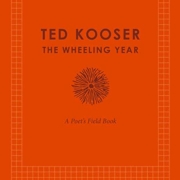
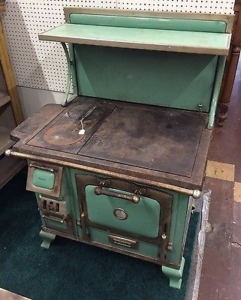 Such a delight this morning to once again open this slim, familiar book.
Such a delight this morning to once again open this slim, familiar book.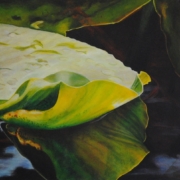
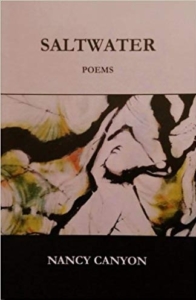 childhood abuse and loss to healing. Though the chronology is from childhood to womanhood, the poems also march from a closed, inner space, claustrophobic, smothering — to an openness where even “skin to skin” contact evokes “meeting in the wilds, / running in meadows.” On the back cover, Mary Gillilan describes how Canyon “bares her soul in order to free it in poems told with white-knuckle honesty” — concluding, “Saltwater delivers the life of a woman from the inside out.”
childhood abuse and loss to healing. Though the chronology is from childhood to womanhood, the poems also march from a closed, inner space, claustrophobic, smothering — to an openness where even “skin to skin” contact evokes “meeting in the wilds, / running in meadows.” On the back cover, Mary Gillilan describes how Canyon “bares her soul in order to free it in poems told with white-knuckle honesty” — concluding, “Saltwater delivers the life of a woman from the inside out.”